
Children of Exile: The Births “Sowing Hope” in the Camp of Nicaraguan Farmers

PUBLICIDAD 1M
PUBLICIDAD 4D
PUBLICIDAD 5D
Alejandro Lagos is a surgeon who has attended over 110 patients who were wounded in the April 2018 repression. He continues seeing them, at no charge.
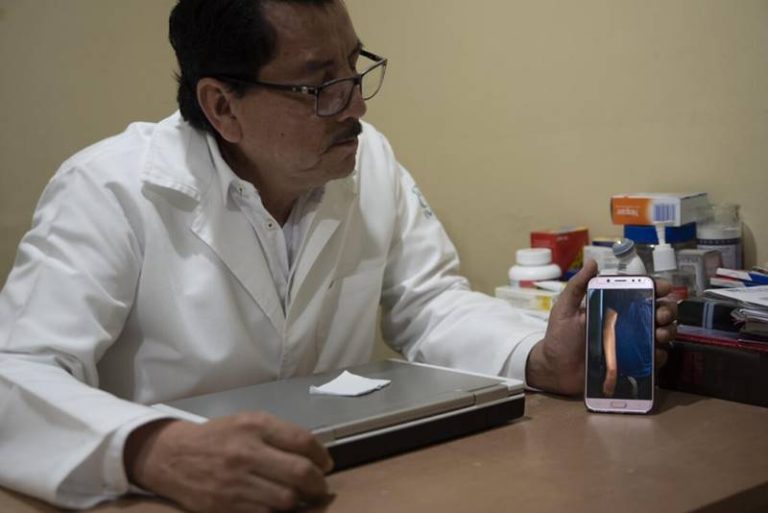
Kevin’s family contacted Dr. Alejandro Lagos Espinoza when the youth, who was wounded during the April protests, was still in the Managua’s “German-Nicaraguan Hospital” with a fractured arm from an AK-47 bullet. The family was desperate, because despite their pleas to the doctors, Kevin wasn’t receiving adequate medical attention. They had him in a hospital bed, but the doctors hadn’t removed the bullet, nor were they doing anything to help him get better. The wound was beginning to become infected, Dr. Lagos recalls. He quickly began attending to him on his own.
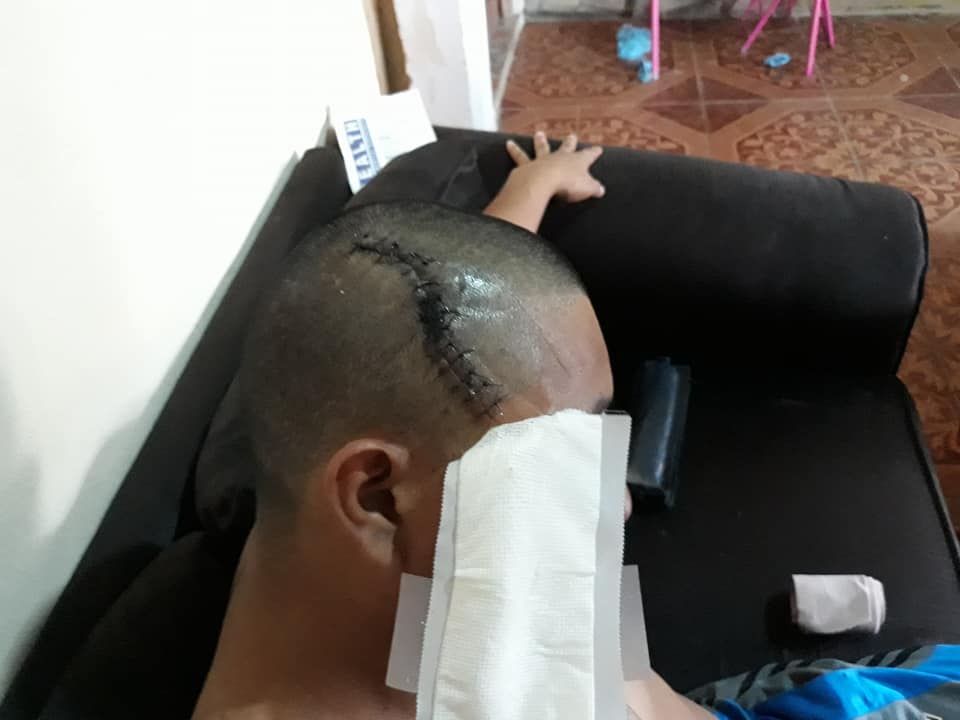
“When the family decided to remove him from the hospital, the doctors there tried to stop them. The first time, the family called me, they were doubtful, but later they called me a second time: ‘Doctor? Are you sure you can take care of him?’ they asked me. ‘Of course!’ I said. And that’s how they brought him to me,” Dr. Lagos recounts.
According to the doctor, the hospital staff decided to improvise a cast before the family took the patient home, and only after that let him leave. Dr. Lagos was ready to help; within a short time, he had operated to remove the bullet. “To date, the arm hasn’t given any problems,” the doctor declares. He maintains that he has a mission to help the young people who suffered wounds during the Nicaraguan protests. He won’t stop, as long as they continue to seek his help.
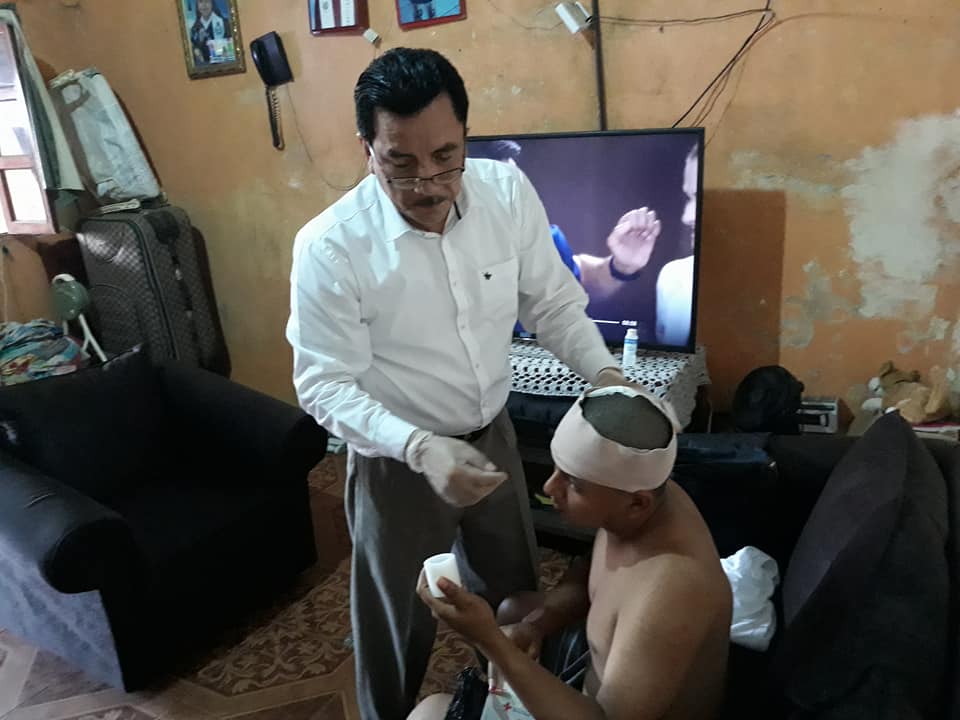
Up until now, he’s given medical attention to at least 110 patients. He’s operated on three youth who had been left unable to walk due to the place where they were shot. One of them is now walking. There are at least four other patients still in need of orthopedic surgery. By this time, Dr. Lagos had earned the admiration of many and the gratitude of those who – either because they lacked the wherewithal or because they were denied medical attention in the public hospitals – have survived the wounds they received during the crisis only thanks to his attention.
Dr. Alexander Lagos Espinoza is a doctor whose discontent with the government of Daniel Ortega didn’t begin in April of 2018, but long before. In 1985, he was jailed and accused of being a CIA agent. The order for his detention was signed by Tomas Borge, and on that occasion, he spent 15 days in the infamous El Chipote jail.
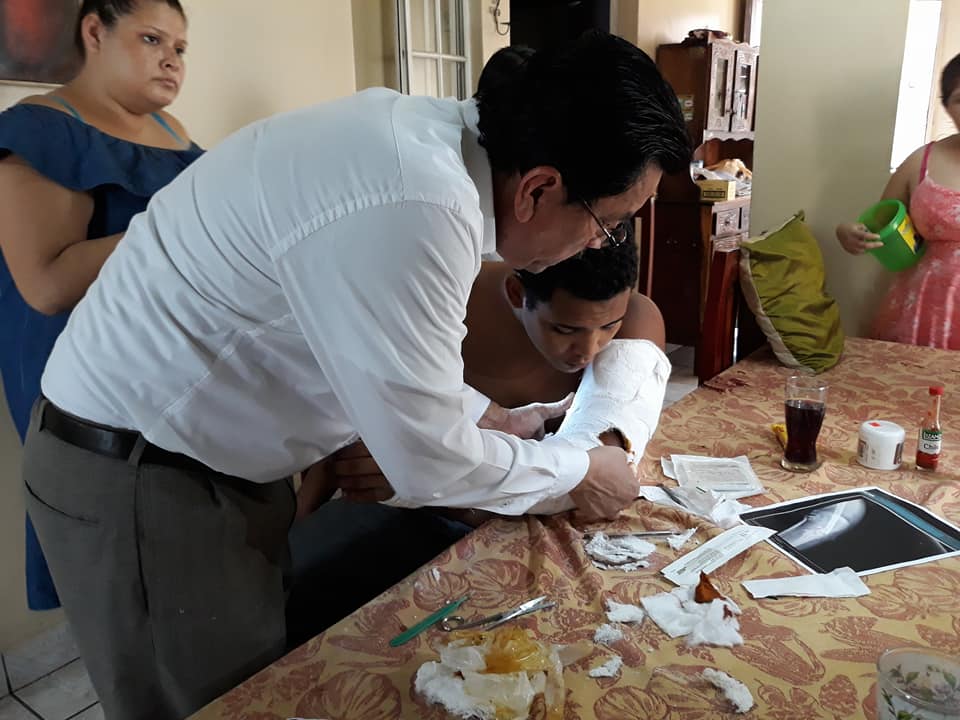
When the April crisis began, the doctor was working privately, making private house calls for which he charged 40 dollars each. He also gave free medical attention to the elderly in the Sor Maria Romero old age home in Managua. Dr. Lagos occasionally posted on Facebook, especially photos of his attention in the retirement home, and at times offering an opinion when there was news of some poorly conceived government gesture.
However, from the 12th through the 25th of April, 2018, he began posting as never before, sharing news, photos, videos, statements. He opposed the censorship of the television channels and condemned the actions of the government, the National Police and the armed Sandinista sympathizers against the population that had gone out to demonstrate in the streets. By April 26, he couldn’t take it anymore and decided that he should use his knowledge as a doctor to do something. “I couldn’t just remain with my arms folded,” he recalls.
His initial intention was to attend to the older people, parents of the youth that were killed. However, he soon changed that idea due to the huge response he received from dozens of young people who had been wounded. He posted another announcement on his Facebook page, this time directed at the youth. “Wounded students: I reaffirm my willingness to continue supporting you with medical attention in your home, in the presence of your family.”
From that moment on, the requests began to arrive: on Facebook, on WhatsApp, and direct calls and messages to his cellphone. He hasn’t denied attention to any of those requesting it. He affirms that he’ll continue doing so, because he committed himself publicly to assisting the students who suffered wounds merely because they wanted to see a better Nicaragua. “My commitment is to help, and I’ll continue doing so, as long as I have the strength,” he insists.
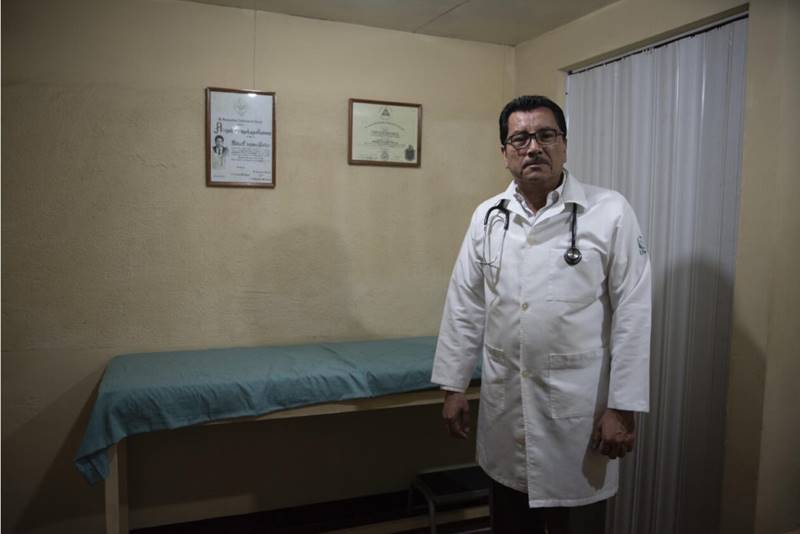
Alejandro Lagos sees some patients in his small office at home, but the majority of his attention is via house calls. Photo: Claudia Tijerino / Niu
“My mother was illiterate. She sold tortillas and nacatamales and washed clothes to bring in money. My father was a mechanic who also made cement blocks for construction. Both were from Masaya. I studied with great difficulty. Why would I hide it? I was poor.” Dr. Lagos states. Nonetheless, by the time he graduated from high school, he knew he wanted to be a doctor. He joked with his classmates, saying that he was going to study medicine in Mexico. Later, his jokes would become reality.
In 1977, he moved in with an uncle who lived outside of the city of Leon so he could study in the university there. Not only did he have to walk more than a mile to get to the university every day, but also at his uncle’s house he had to study at a small table by the light of a candle that had to be blown out at exactly 10 pm every night. After six months of his freshmen year, Dr. Lagos found himself unable to get his grades up above 87, when he needed an average of 90 to classify to study medicine. He managed to transfer to student housing, but even so he couldn’t seem to raise his grades.
When the year was almost over, and much of his enthusiasm had turned to disappointment, he arrived home one day and encountered a family friend there: Dr. Carlos Sanchez Morales, a surgeon, head of the Lion’s Club, and a close friend of the family. “Dr. Sanchez said to me: ‘Come see me tomorrow at 7. I’m going to give you the money to study in Mexico. My son is studying in Guadalajara.’”
When he arrived, Sanchez opened his safe and handed him some papers. The doctor recalls: “I was waiting for him to hand me dollars, but instead he gave me these six long pieces of paper.” After that, Sanchez told him to go to the Mexican Embassy the following day, and his brother would give him the papers he needed to travel to Mexico on a student visa.
“So, I left there on foot, in tears.” Dr. Lagos recalls telling his father, who was talking with a neighbor at the time: “That old man deceived me! – he told me that he was going to give me money, and he just gave me these papers.” The neighbor quickly informed him that the “papers” the doctor had given him were travelers’ checks, for 100 dollars each, and that these could be converted into cash anywhere in the world. “How could I have known that?” the doctor now recalls with a laugh.
He immediately went to get the documents from the embassy, while his father went to the bank and secured a loan to pay for the airplane ticket.
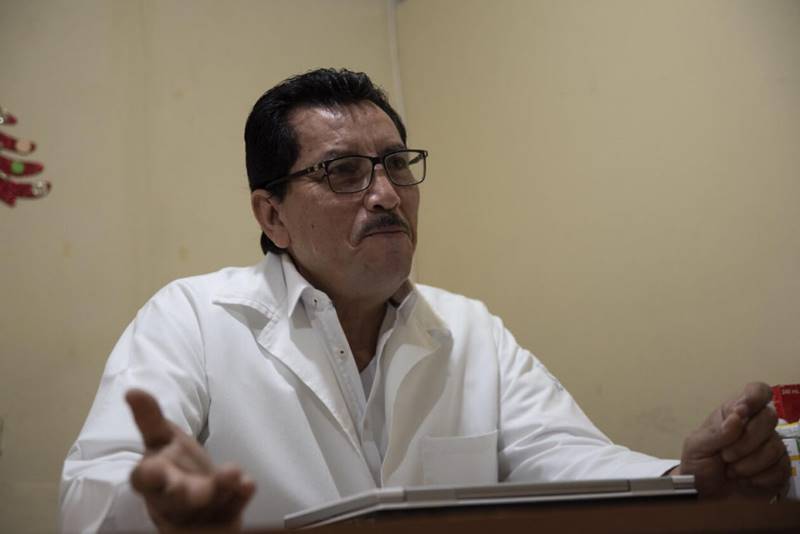
Despite the obstacles he faced along the road, this doctor maintains that he never betrayed his ideals. Photo: Claudia Tijerino / Niu
Once in Mexico, new difficulties arose. An acquaintance there had promised to help him if he ever came to the country, but what he did was to take his travelers’ checks with false promises and mistreat him. Eventually, Dr. Lagos decided to strike out on his own.
He eventually found people to help him, among them a Japanese karate trainer. Alejandro would go to watch him practice, and soon learned the discipline. It was the trainer who helped him get into the University of Puebla with a sports scholarship. And that’s how he was able to finish his six years of medical studies, during which he also taught karate, subsisting on this and on the little money that his father was able to send from Nicaragua.
“I did my social service in Chiapas, Mexico. Later, I wanted to become a plastic surgeon. However, in my first year of residency for this specialty, they called me in and told me that I had to do a year of social service in my country of origin in order to continue. That’s how I came back to Nicaragua,” Dr. Lagos states.
After graduating as a general doctor and surgeon in Mexico, Dr. Lagos’ medical career in Nicaragua included a stint as the director of the health center in the Villa Venezuela neighborhood. He began a residency for neurosurgery in the Lenin Fonseca hospital in Managua, and when he was in the third year of that residence, he founded the “Movement for a Better Salary.” This movement would later cost him the possibility of finishing his specialty in Germany.
In the German embassy they gave him everything he needed: airline tickets, money for all his expenses, even for clothing,” the doctor recalls. The only thing he lacked was the hospital director’s signature, “at that time Gina Watson,” Lagos notes. When he approached her, “she grabbed my papers and tore them into pieces,” he recalls.
“The revolution isn’t going to send a counterrevolutionary to study,” were the director’s words. Following that altercation, he was fired. There was a hearing in which a judge ruled in his favor and ordered his reincorporation. However, the hospital directors, all allied with the government at that time, forbade him from touching a patient, operating, or even making chart notes.
According to Dr. Lagos, the Health Minister at this time came to his door and offered him a scholarship to study public administration. “He had noticed a report I wrote regarding a measles epidemic in Nicaragua’s mining triangle. He told me he thought I had the skills for administration,” says the doctor. The doctor finished this Masters’ in Public Health. He later worked at the central Health Ministry and eventually returned to Mexico to study hospital management. Upon his return, he served in management roles in several key hospitals.
By 2007, he was working as a consultant for the World Bank, in charge of supervising the accreditation parameters for the provisional social security clinics. However, when the government changed, the projects financed by this bank were turned over to the Health Ministry where he was told he was no longer part of this team.
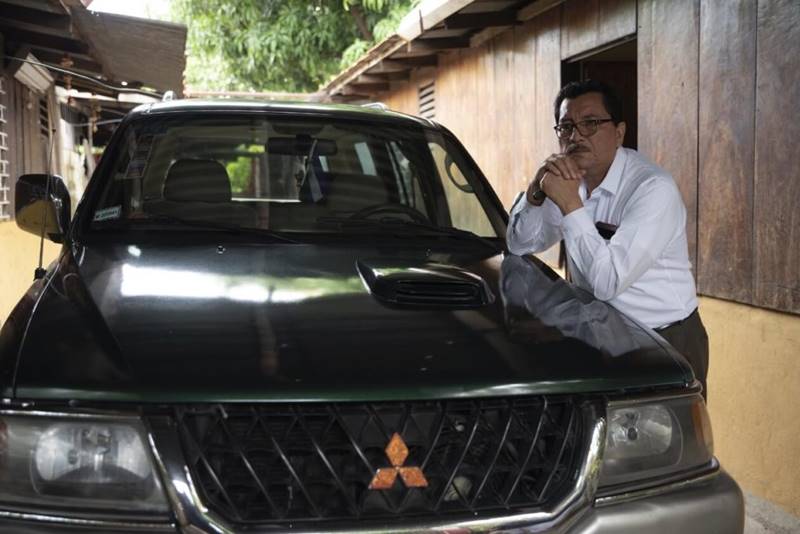
In this vehicle given to him as a present from one of his patients, Dr. Alejandro Lagos Espinoza does his house to house visits to those wounded during the April 2018 rebellion. Photo: Claudia Tijerino / Niu.
“When I first left for Mexico, my parents told me: “Someday, we’d like to see you caring for the poor like Dr. Apolonio Berrios,” he recalls. Berrios was a doctor who offered free consultations and attention, principally to those with Down’s Syndrome. He was the one who gave Lagos’ father the land where Dr. Alejandro Lagos lives today. Berrios became a role model for him, and that’s one of the reasons that motivated him to attend to those wounded during the April rebellion.
“The requests didn’t all begin on April 19; many had been in the public hospitals, but they were treated badly. I’m currently seeing six who need a lot of care. We’ve invested in lab tests to check for severe infectious processes. The medical attention has been poor, there hasn’t been anyone with knowledge and responsibility to appeal to, but we’re there trying to help,” the doctor maintains.
He also speaks of the three patients he’s operated on in private hospitals; in other cases, he’s removed bullets in his small office. “They ask me: ‘Why do you keep doing it?’ First, because I made a public commitment to accompany them until they recover and don’t need medical attention anymore. And secondly, because I’ve noticed that there’s a hidden policy in the public hospitals of rejecting the patients wounded by firearms, because they know that those responsible for their wounds have been the paramilitary and the police,” the doctor affirms.
Dr. Lagos states that he’s written detailed reports on each patient. He presented these reports as testimony before the Inter-American Commission on Human Rights. He hopes that those charged with negotiating with the government soon find a way out of the crisis and can help the patients that he’s been attending on his own, using his personal resources and some donations. Meanwhile, the calls and message don’t stop coming, and he continues to be willing to continue curing.
PUBLICIDAD 3M
PUBLICIDAD 3D